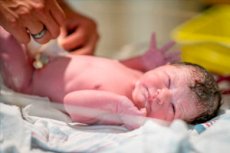Nye publikasjoner
Studie viser at vannfødsel er trygt
Sist anmeldt: 02.07.2025

Alt iLive-innhold blir gjennomgått med medisin eller faktisk kontrollert for å sikre så mye faktuell nøyaktighet som mulig.
Vi har strenge retningslinjer for innkjøp og kun kobling til anerkjente medieområder, akademiske forskningsinstitusjoner og, når det er mulig, medisinsk peer-evaluerte studier. Merk at tallene i parenteser ([1], [2], etc.) er klikkbare koblinger til disse studiene.
Hvis du føler at noe av innholdet vårt er unøyaktig, utdatert eller ellers tvilsomt, velg det og trykk Ctrl + Enter.

Ny forskning bekrefter at for kvinner med ukompliserte svangerskap er vannfødsel like trygt som å forlate vannet før fødselen. Studien, «Maternal and neonatal outcomes in vaginal births occurring in or out of water after intrapartum water immersion: the POOL cohort study», ble publisert i BJOG: The International Journal of Obstetrics and Gynecology.
Forskere studerte fødselsopplevelsene til mer enn 87 000 kvinner med ukompliserte svangerskap som brukte vannnedsenking under fødselen for komfort og smertelindring. Studien hadde som mål å finne ut om det å bli i vannet for å føde var like trygt for mødre og babyer som å forlate vannet før fødsel.
Professor Julia Sanders, professor i klinisk jordmorfag ved Cardiff University, som ledet forskerteamet, sa: «Rundt 60 000 kvinner bruker et fødebasseng eller -bad hvert år i Storbritannia for å lindre smertene ved fødselen, men noen jordmødre og leger var bekymret for at vannfødsler kunne medføre ekstra risiko. Det var rapporter om babyer som ble alvorlig syke eller til og med døde etter vannfødsler, og mødre hadde større sannsynlighet for å lide av alvorlige rifter eller overdrevent blodtap. Så det var behov for en stor studie for å se på sikkerheten ved vannfødsler i Storbritannia.»
«Vi ønsket å finne ut om vannfødsler med jordmødre i NHS er like trygge som fødsler utenfor vann for kvinner og babyene deres, med lav risiko for komplikasjoner», sier Julia Sanders, professor i klinisk obstetrikk og gynekologi.
POOL-studien, ledet av Cardiff University School of Public Health og Centre for Clinical Trials Research, undersøkte NHS-journaler for 87 040 kvinner som brukte et basseng under fødselen mellom 2015 og 2022 på tvers av 26 NHS-foretak i England og Wales. Forskerne så på forekomsten av alvorlige rifter kvinner fikk, hvor ofte babyer trengte antibiotika eller pustehjelp på nyfødtavdelingen, og forekomsten av babydødsfall.
«Hovedmålet med studien vår var å svare på et spørsmål som ofte stilles av kvinner som bruker fødebassenger eller -kar under fødsel – fødselsleger spør ofte mødre om de bør holde seg i eller ute av vannet for å føde hvis fødselen fortsetter uten problemer.»
«Blant kvinnene vi studerte, kom noen ut av bassenget for å få ekstra medisinsk behandling eller ekstra smertelindring. De fleste kvinnene som kom ut av bassenget for å få ekstra medisinsk behandling var førstegangsfødende – 1 av 3 førstegangsfødende kom ut av bassenget for å få ekstra medisinsk behandling, sammenlignet med 1 av 20 kvinner som allerede hadde født», sier Sanders.
Totalt sett fant forskerne at omtrent halvparten av alle kvinner som brukte basseng under fødselen fødte i vann.
Forskerne fant at omtrent 1 av 20 førstegangsfødende og 1 av 100 mødre som fødte for andre, tredje eller fjerde gang hadde en alvorlig rift. De fant også at omtrent 3 av 100 babyer trengte antibiotika eller pustehjelp på nyfødtavdelingen etter fødselen, og spedbarnsdødsfall var sjeldne. Men forekomsten av disse og andre komplikasjoner var lik for fødsler i og utenfor vann.
Dataene deres viste at keisersnittraten var lav, mindre enn 6 % for førstegangsfødende og mindre enn 1 % for andre-, tredje- eller fjerdegangsfødende.
«Gitt at 10 % av kvinner bruker vanndypping for smertelindring under fødsel, vil resultatene av denne studien påvirke tusenvis av kvinner hvert år i Storbritannia og mange flere rundt om i verden der vanndypping under fødsel er vanlig praksis», sier professor Peter Brocklehurst.
Professor Chris Gale, konsulent i neonatologi ved Chelsea and Westminster Hospitals Foundation Trust i London, sa: «Mange barneleger og neonatologer er bekymret for at vannfødsler kan medføre ytterligere risiko for babyer, men studien fant sterke bevis for at dette ikke er tilfelle for kvinner med ukompliserte svangerskap.»
Rachel Placzynski, en foreldrerepresentant i studieteamet og en tidligere fødselslærer, sa: «Det er også betryggende å se at jordmødre legger merke til potensielle problemer under fødselen og oppfordrer disse kvinnene til å forlate svømmebassenget slik at mødre og babyer kan få passende overvåking og pleie.»
«Forskningen vår har vitenskapelig bekreftet at vannfødsler ikke medfører noen økt risiko for mødre og babyer. Ved å undersøke NHS-data fra mer enn 87 000 fødsler i England og Wales har vi vært i stand til å gi informasjon som kan støtte mødre og jordmødre i deres beslutningstaking under fødselen», la professor Sanders til.
